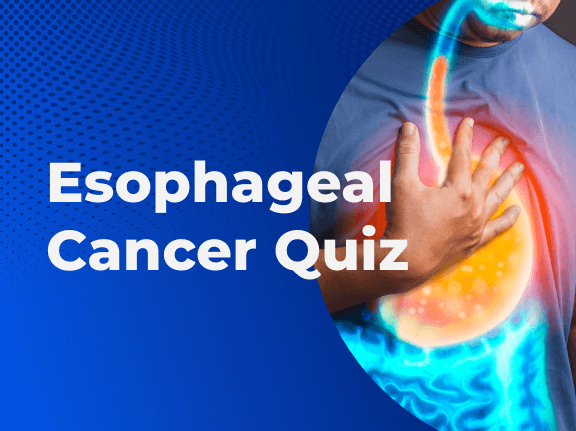
Esophageal Cancer Quiz
This online assessment takes only 2 minutes. It will help you find the right clinical trials for you.

Fiona Evans
We ask this to determine which clinical trials you may be eligible for.
If you need to contact us right away?
Call +1 844 627 7246Your personal data is fully confidential and 100% secure
The Esophageal Cancer Quiz introduces the two most common types, demographics, and risk factors. Esophageal cancer is a disease in which malignant or cancerous cells form in the tissues of the esophagus. Men are about three times more likely than women to develop esophageal cancer, and while children are less likely to be diagnosed; these malignant tumors can occur in all demographics and can be treated with radiation therapy, chemotherapy, and surgery.
Avoiding cancer risk factors may help prevent certain cancers. Risk factors include smoking, being overweight, and not getting enough exercise. Increasing protective factors such as quitting smoking and exercising may also help prevent some cancers. The risk factors and protective factors for squamous cell carcinoma of the esophagus and adenocarcinoma of the esophagus are not the same.
What is Esophageal Cancer?
Esophageal cancer is a disease in which malignant (cancer) cells form in the tissues of the esophagus. The esophagus is the hollow, muscular tube that moves food and liquid from the throat to the stomach. The wall of the esophagus is made up of several layers of tissue, including mucous membrane (inner lining), muscle, and connective tissue. Esophageal cancer starts in the inner lining of the esophagus and spreads outward through the other layers as it grows.
What are the two most common types of Esophageal Cancer?
- Squamous cell carcinoma: Cancer that forms in the thin, flat cells lining the inside of the esophagus. This cancer is most often found in the upper and middle part of the esophagus but can occur anywhere along the esophagus. This is also called epidermoid carcinoma.
- Adenocarcinoma: Cancer that begins in glandular cells in the lining of the esophagus produce and release fluids such as mucus. Adenocarcinoma usually starts in the lower part of the esophagus, near the stomach.
Squamous Cell Carcinoma Risk Factors: Smoking and Alcohol Use
Studies have shown that the risk of squamous cell carcinoma of the esophagus is increased in people who smoke or drink a lot.
Adenocarcinoma Risk Factor: Gastric Reflux
Adenocarcinoma of the esophagus is strongly linked to gastroesophageal reflux disease (GERD), especially when the GERD lasts a long time and severe symptoms occur daily. GERD is a condition in which the contents of the stomach, including stomach acid, flow up into the lower part of the esophagus. This irritates the inside of the esophagus, and over time, may affect the cells lining the lower part of the esophagus. This condition is called Barrett esophagus. Over time, the affected cells are replaced with abnormal cells, which may later become adenocarcinoma of the esophagus. Obesity in combination with GERD may further increase the risk of adenocarcinoma of the esophagus.
The use of medicines that relax the lower sphincter muscle of the esophagus may increase the likelihood of developing GERD. When the lower sphincter muscle is relaxed, stomach acid may flow up into the lower part of the esophagus.
It is not known if surgery or other medical treatment to stop gastric reflux lowers the risk of adenocarcinoma of the esophagus. Clinical trials are being done to see if surgery or medical treatments can prevent Barrett esophagus.
Source: https://www.cancer.gov/types/esophageal/patient/esophageal-prevention-pdq
Almost Done!
Please complete the required fields and we will send results to your email.
You have completed the quiz.
0 out 0 answers are correct

We ask this to determine which clinical trials you may be eligible for.
Fiona Evans Massive Bio Patient Relations CoordinatorIf you need to contact us right away?
Call +1 844 627 7246Your personal data is fully confidential and 100% secure

© 2024 Massive Bio. All rights reserved




